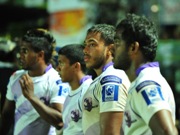Dr. P. Saravanamuttu
Two contrasting insights into reconciliation were on display in the last ten days – one in the field of sports and the other in the field of politics. The former relates to the Carlton Super Seven Rugby Tournament and the latter to the ITAK or Federal Party convention in Batticaloa.
The significance of the latter is of course beyond dispute given that it was the party convention of the major party in the Tamil National Alliance (TNA) and the speech made by its leader R.Sampanthan has been the subject of columns, editorials and dire conclusions on what it portends for the fate of the nation-state of Sri Lanka. The former may seem trivial by contrast – a sporting event, even tamasha, that attracted the attention of few. Sporting events though have their role to play in reconciliation and are replete with political significance and purpose. The Carlton Super Seven Rugby Tournament was no exception. Joint winners of the tournament was a team called the Jaffna Challengers captained by a young naval officer who also happens to be a son of the President of the republic.
One assumes that the choice of name for the team had some reconciliatory purpose – there were others with regional and provincial titles. This columnist is not clear as to whether any of the other teams had any connection to the parts of the country they were named after. By all accounts the winning team did not – rugby not being a sport to have taken hold in the Jaffna peninsula to date. It would seem to be the case that the choice of team name was either prompted by a desire to introduce the sport to the peninsula and integrate the peninsula into this sporting loop of increasing prominence and profit and/or an act very much in the spirit of the captain of the team’s uncle’s remarks about all parts of the country being accessible to all the peoples of the country, the north being no exception. Yet another victory lap by the winning team before the bewildered population of Jaffna, may well be on the cards. And someone may wave a Tiger flag on this occasion too!
Talking of flags, the highly respected TNA leader Mr Sampanthan is in effect being accused of irresponsible and even dangerous “flag waiving” – by some Tamil nationalists with regard to the Lion flag at the beginning of the month at the joint opposition rally in Jaffna and with regard to the Tiger flag at the end of the month by all – Island patriots, on account of sentiments expressed in his speech at the ITAK convention in Batticaloa. The truth of the matter, as this columnist sees it, is that Mr Sampanthan has to speak to both constituencies and the international community beyond, if he is to lead and hold together his party and his people within a united Sri Lanka. Once can disagree about language and tone, but should not lose the wood for the trees. Yes he did talk about a future outside of Sri Lanka, about external self-determination and about what could follow from this government not addressing the aspirations of the Tamil people. He did not talk about this, though, as the first option or the preferred one.
In any and every event, is not the point to pull the political rug from under the secessionists’ feet? How irresponsible, dangerous and unreasonable have Mr Sampanthan and his party been in the pursuit of a political settlement of the ethnic conflict since the defeat of the LTTE as evinced by their behavior in the direct talks between them and this government or is it the SLFP – as they are now being told, contrary to the evidence of the letter inviting them to talks which was published in a week end newspaper? Have they not demonstrated commitment and good faith, forwarded proposals – stretching from the Mangala Moonesinghe proposals to the PA 95 and 97 proposals, the August 2000 draft constitution and the APRC Experts Committee report- and made clear that they will participate in a select committee once a consensus is reached between them and the government which can be forwarded to that select committee for discussion with the wider group of stakeholders?
The real tragedy is that Mr Sampanthan had to make the speech at all and in the tone and language he did. It is a measure of the state of reconciliation and unity in the country. To this columnist the speech was about consolidating the TNA position within the Sri Lankan and Tamil polity and the ITAK position within the TNA as primus inter pares rather than as sole representative of the Tamil – speaking peoples mapping out a strategy for secession. In narrow political terms it is about holding the TNA and the Tamil polity together, lest as times goes by and is deliberately allowed to through procrastination and deceit, the Tamil polity fragments into a combination of pitiful incoherence on the one hand and obdurate extremism on the other. It probably and sadly is the case that there are two polities in this context, each delineated by ethnicity and each the mirror image of the other. Mr Sampanthan may well have a similar problem, if not the same, with his hard- core nationalists as President Rajapaksha with his!
The overarching question as always is as to whether the politics of hurt and harm and hate should be allowed to hold the country to ransom?
It should not. Mahinda Rajapaksha has a pivotal role to play in this. Quite frankly, his inability and/or unwillingness to do so, is far more damaging to unity and reconciliation than any interpretation of any speech Mr Samapanthan may make; his willingness and ability to do so immeasurably greater a contribution to unity and reconciliation than any contribution the Jaffna Challengers can make!
GV
